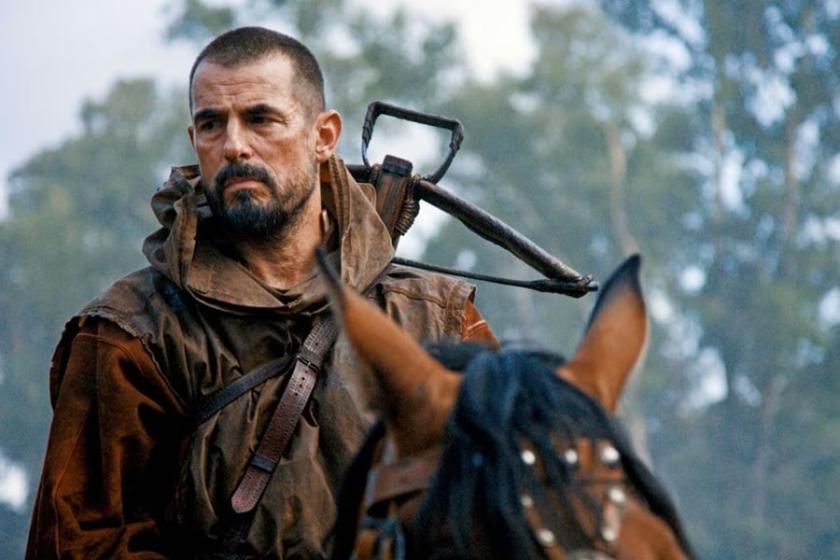Despite Rossini’s banger of an overture and a Looney Tunes cartoon starring Daffy Duck as William Tell, I’ll wager that few non-German-speakers can recite the precise details of the Swiss folk hero’s legend. Beyond, that is, describing him as a Robin Hood of the Alps whose crossbow arrow pierced the apple perched on his son’s head. However, in a stirring new action-adventure movie Tell turns out to be a surprising protagonist.
Writer-director Nick Hamm based William Tell on Friedrich Schiller’s 1804 drama, itself the source of Rossini’s opera. After a sluggish opening, in which Tell (Claes Bang), an ex-Crusader turned farmer (and fisherman and arms-maker), urges his mountain neighbors to avoid conflict with Austrian-Habsburg invaders, the movie lets fly with late Middle Ages mayhem.
It's easy to identify who’s who. Team Habsburg, wearing black and metallic fetish gear, go in for tax collection (daily), and sex crimes (off screen). Their king (Ben Kingsley) sports a gold eyepatch, and the bully-boy enforcer (Connor Swindells, pictured below), forces villagers, including Tell’s hapless son, to bow to his helmet. (Boo! Horrible Habsburgs!)
 Whatever the Swiss (Hooray!) lack in military might, they make up for with an eye for bold textiles and artfully draped menswear of buttery leathers in cocoa-brown. The costumes by Francesca Sartori and, indeed, the entire production look wildly expensive.
Whatever the Swiss (Hooray!) lack in military might, they make up for with an eye for bold textiles and artfully draped menswear of buttery leathers in cocoa-brown. The costumes by Francesca Sartori and, indeed, the entire production look wildly expensive.
The dialogue, though, is often hilarious: “He braved the lake in all its wrath”; “Father, what’s that helmet doing in the square?”; "Know your place, woman", which is only funny when Swindells says it. To deliver big ideas (about freedom, destiny, shooting apples off boys’ heads), the actors tend to plant a foot down stage and speak in the grand enjambments and broad vowels of the British stage.
Yet Claes, the Danish star best known in the UK for playing villains (Count Dracula, the awful brother-in-law in Bad Sisters), proves to be an able swashbuckler and a thoughtful leader, one with terrible experience of what happens when war, however righteous, drags on.
To its credit, William Tell finds room for noble sentiments amid rousing action sequences like the storming of castles. And there are no less than three fully realised female supporting roles: a princess-diplomat (Ellie Bamber), Tell’s war-weary Muslim wife, Suna (Iranian star Golfshifteh Farahani), and rabble-rousing Gertrude (Emily Beecham), who's married to Tell’s best mate (Rafe Spall).
The movie’s cliffhanger ending, which plays like a pitch for a superhero action franchise, is truly shameless. Can we look forward to an extended William Tell universe, with more sons and more apples on their heads? If so, let’s hope that they arrive, like this good-natured throwback, with the satisfying thwack of a marksman’s arrow hitting its target.















Add comment